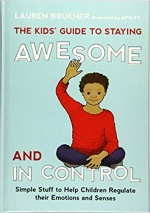Unconditional Love Creates Emotional Intelligence
October 12, 2019
Quote of the Week
"A child who grows into a person who walks in love, follows his own inner compass, and acts with powerful presence. A person who makes the world a better place, just by being himself or herself. " -- Dr. Laura Markham
The Most Important Thing You're Teaching Your Child
 "Most parents take their job as teachers very seriously. We teach our kids colors. ABCs. Taking turns. Right from wrong. But sometimes we don't even notice a much more important lesson we're imparting to our children: how to manage their feelings, and therefore their behavior.
"Most parents take their job as teachers very seriously. We teach our kids colors. ABCs. Taking turns. Right from wrong. But sometimes we don't even notice a much more important lesson we're imparting to our children: how to manage their feelings, and therefore their behavior.
This is the basis of emotional intelligence (EQ), which will determine their quality of life much more fundamentally than their IQ. When adults scream at their partners, procrastinate at work, spend money they don't have or use substances to ease their pain, those are moments of emotional dysregulation, or not being able to self-regulate. In fact, much of the drama and unhappiness in our lives comes from our own challenges in regulating our emotions.
Wouldn't it be an amazing gift to your child to help him or her develop the ability to self-regulate, even when life sends them rough weather? (Because every life has some rain.)" [read article]
Reading Corner
 Title: The Kids' Guide to Staying Awesome and In Control
Title: The Kids' Guide to Staying Awesome and In Control
By: Lauren Brukner
Ages: 7-14
Why: "Packed with simple ideas to regulate the emotions and senses, this book will help children tackle difficult feelings head-on and feel awesome and in control! From breathing exercises, pressure holds and finger pulls, to fidgets, noise-reducing headphones and gum, the book is brimming with fun stuff to help kids feel cool, calm and collected. They will learn how to label difficult feelings, choose the perfect strategies and tools to tackle them, and use these correctly whether at home or at school. The strategies and tools are accompanied by cartoon-style illustrations, and the author includes useful tips for parents as well as handy visual charts and checklists to track learning and progress." -- Publisher
Be the Change
As the article suggests, one of the most important ways children learn to regulate their emotions is by having parents who model this. This week, when your child behaves out of the ordinary, has a tantrum or gets angry, take a moment to see past their action to understand the source of their emotion. Connect with your child and respond by asking how you can help instead of reacting to their behaviour.





